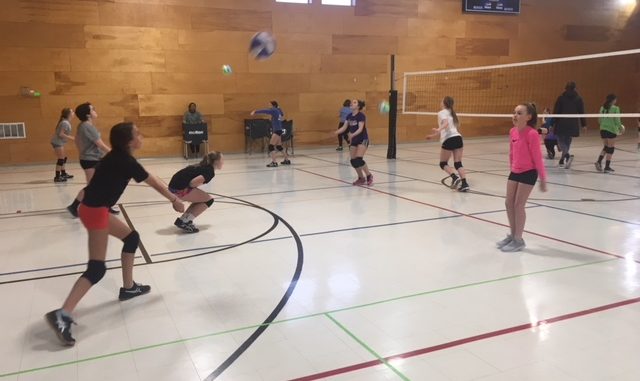
The transition from amateur player to college player involves many things, including finding enough passion and motivation to pursue a place an an elite level of the game. Commitment, hard work and love for the game — that is what the members of the Truman State University volleyball team want young girls to understand through their example and instruction as youth coaches in the community.
During the offseason, the Bulldog volleyball players step off of the court and onto the sideline to fill the coaching leadership role and teach volleyball to girls in the Kirksville community. Head coach Ben Briney said his players instruct girls from ages 11-18 to spark early interest in the sport throughout the community and provide to his players with an opportunity to see the game from a different perspective.
“They get an opportunity to see what it’s like to be that coach and have to come up with a coaching plan,” Briney said. “I think that makes them better at the game.”
Instead of participating in the drills prepared by Briney as they would in their daily practice routines at Truman, players are in charge of preparing drills that will test the girls. He said this can help his players see the value in drill work that refines fundamentals and challenges their skills.
Briney said his players can also benefit from watching the girls’ techniques. Briney said observing the detail from a coaching standpoint can help his players stay aware of their own techniques when they play.
Briney said the young amateur players really benefit most from watching his players compete during the season. He said his players can serve as qualified role models because they were in the same position when they were younger. Observing even just one person can give an amateur the motivation and interest needed to pursue a volleyball career, Briney said.
Briney said his interest in the sport grew after watching three-time-Olympic-gold medalist Karch Kiraly play the beach volleyball circuit in the 1990s — a time he won his third gold medal at the 1996 Summer Olympics in Atlanta, Georgia. He said this helped convince him to pursue a volleyball career.
Sophomore setter Megan Gasper said she became interested in the sport at a young age, when her father — who was also a volleyball coach — taught her the game at about the same time she was learning to walk. As she grew up, she said this interest turned into a passion for the sport.
Gasper said her excitement to be a head coach this year is because of her father. She said she had her first coaching opportunity in an amateur league in her home state of North Carolina and would love to have similar opportunities to be a part of the game after college.
Gasper said she sees this years’ coaching opportunity more as a hobby than another schedule commitment because anything where she can utilize her passion for volleyball is fun for her. She said she hopes she can influence the girls she coaches to see volleyball in a similar way.
“Seeing that they love being there and that it’s important to them — I think that’s probably the most important thing for me as a coach,” Gasper said.
Gasper said she loves to see the girls’ growth when they are able to learn a skill they might have been struggling with the previous practice. She said seeing them regularly overcome these challenges without being discouraged reminds her to be persistent when she plays. This pays off when the girls come to Gasper’s games to study their role model.
Aware of their presence, Gasper said it is surreal when her girls watch her play, because she was once in the stands watching her own role models of the sport. She said she had dreams to become a college volleyball player after watching players like Pennsylvania State University’s Alyssa D’Errico. D’Errico is the only player in NCAA Division I volleyball history to have won four national championships after also winning state championships in her last three years of high school. She went on to become a coach herself. Gasper said having good role models is important because they not only provide guidelines on how to be successful in sports but also how to live all aspects of life.
“It gives you a good outlook on your life,” Gasper said. “You can value those characteristics and also implement them into your daily life to make people and the world around you a better place.”
